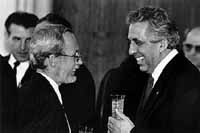On this second weekend of open borders, millions of East Germans are on the road, visiting nearby West German cities or West Berlin. East German trains are at »four hundred percent capacity,« and there are tumultuous scenes on the platforms. Despite rapid processing of documents at highway border crossings, the lines stretch for kilometers. The attraction is not only the West's newness, but also the West German government's »welcome money,« which - aside from the permitted currency exchange of 15 DM per person per year in East Germany - is the only legal way to obtain Western currency.
But for many it's not enough, as the full store windows are too much of a draw. Once again, large amounts of East German currency flow into exchange offices, even though the exchange rate of 1:12 to 1:20 continues to be unfavorable. Because of this situation, Prime Minister Modrow warns his countrymen and women not to »throw away« their hard-earned money in the West.
Council of State Chairman Egon Krenz swears in the new coalition government. Instead of an oath, this consists of a simple handshake. But the problem remains that this is not a democratic government that was the product of free elections. Nor are the new political forces represented; the government is merely transitional.
New Forum's first officially sanctioned rally takes place on Dimitroff Square in Leipzig, but because of the exodus of travelers to the West, attendance is lower than expected. Some 20,000 people gather to demand free elections and freedom of the press. In Plauen, too, 10,000 march to the town hall, and in Suhl, in Thuringia, roughly 5,000 respond to a call from New Forum; 7,000 do the same in Eberswalde-Finow. Repeated demands include radical economic reform, democratization of political life and environmental protection. In Dresden, 50,000 rally for protection of the city's landmark buildings and an end to the selling off of national art and cultural treasures.
© 1999, Christoph Links Verlag, Berlin

